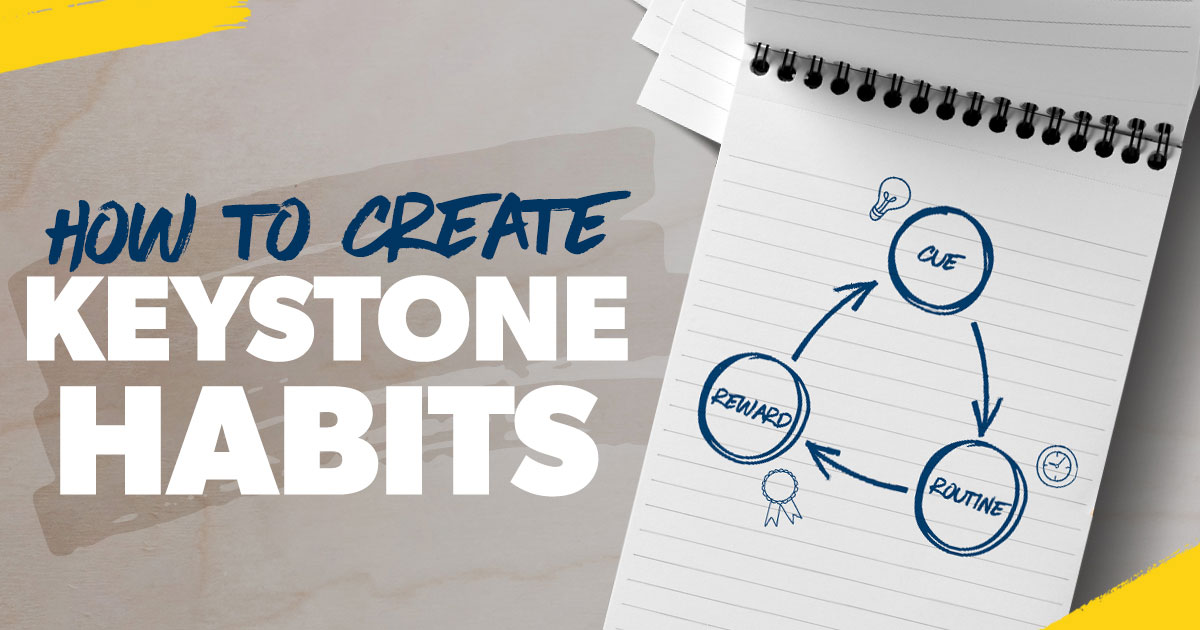
Come sleet or snow, hell or high water—some people just seem to GSD. Get. Stuff. Done. Crush a morning workout? Check. Read three chapters of a book before their first sip of coffee? Check. Stick to a zero-based budget? Big ol’ check. These unicorns complete their list of tasks (and even things beyond their list) every day. Want to hear their not-so-secret secret? They’ve developed keystone habits—and you can too.
But before we dive into the what, where, why and how, we need to introduce you to the who: author and Pulitzer Prize-winning reporter Charles Duhigg. He first showcased keystone habits in his book The Power of Habit, which went on to become a New York Times bestseller. We’ve gathered some of Charles’ best tips and tricks so you can learn how to develop keystone habits and improve your life.
What’s a Habit and a Keystone Habit?
A habit is a routine behavior. It’s almost involuntary, meaning you do it without thinking. And we’ve got all kinds of habits to make our everyday lives easier. Habits are valuable because the less time you spend thinking about what action to take, the faster you can act.
Then, there are keystone habits—the big ones that kick-start other habits. These don’t have to be complicated or out of reach. They simply get the ball rolling for you to create even more habits to help you become the best version of yourself.
Free EntreLeadership Reading Guide
What should EntreLeaders read? We've got our list of book recommendations, with 100 book titles on topics like hiring, business strategy, sales, leadership and more!
Why Are Keystone Habits Important?
Charles explains how keystone habits can change your life with a simple example: exercise. Let’s say you decide you want to lose 30 pounds, so you make an exercise plan and start hitting the gym three days a week. When you sit down for dinner after working out, you find yourself reaching for the salad mix more often than the leftover pizza.
And since your eating habits are changing, you become more conscious of what you put on your grocery list. You start to choose more fresh foods and limit impulse buys (like your favorite ice cream or candy bar) during your trips to the supermarket. Before you know it, you’re even sleeping better because you’re tracking your sleep schedule.
See what’s happening? What started as just a simple exercise routine (the keystone habit) caused a ripple effect of other (secondary) positive habits. And secondary habits don’t necessarily have to be related to the original keystone habit. Charles shares that research has found that people who start exercising regularly also improve in other areas of their lives. He points out that better habits, like using credit cards less (or not at all) and doing the dishes more, are possible unexpected bonuses of developing a keystone habit.
“When you start to change a habit, it sets up this chain reaction,” Charles said in his interview with EntreLeadership. “Both on the job and on the home front, keystone habits get you focused on one area you can improve and lead to progress in other areas.
Keystone habits tap into something you care about deeply, and they’re powerful enough to trigger secondary habits. Because you’re working on yourself, the secondary habits you didn’t even mean to create start appearing in both related and unrelated areas of life. And just like that, these habits have become a part of your everyday life through what Charles calls a habit loop.
What Is a Habit Loop?
A habit loop is how habits are created. Charles breaks the loop down into three parts:
- A cue: a trigger telling your brain to act on something. Cues can be centered around a location, time of day, emotions, people around you, or a previous action. For example, a stop light turning red is your cue to stop.
- A reward: something that satisfies a craving that we may or may not know we have. This can look like sitting down to watch a TV show after cleaning the house or something as simple as getting a snack when your brain tells you you’re hungry.
- A routine: the actions you take triggered by a cue to get a reward. If you want to feel awake by the time you get to work in the morning (reward) because you’ve noticed you barely get anything done before lunch (cue), your routine might look like going to sleep earlier the night before and eating a balanced breakfast when you wake up. If you write down your routine, you’re more likely to stick to it. And be sure to post it where you’ll see it every day!
We all use habit loops every day—even if it’s as simple as making that first cup of coffee in the morning to become a functioning human again. These loops can become so unconscious and engrained in our lives that they help us complete some tasks automatically (even complex ones)—like when you go on autopilot driving home and safely roll up to your driveway.
How Do I Make a Keystone Habit?
This is important: You can’t squash a habit. You can only change it. Charles’ golden rule of habit change is to use a similar cue to one you’re already used to. And when you see or hear that cue, practice the new routine slowly over time. Then reward yourself with something you crave. As you do this more and more, you’ll create a new habit loop that sets you up for lasting change.
Ready to be challenged, inspired and motivated by the world’s top business and thought leaders? Join us online for the EntreLeadership Summit livestream—you can even invite your team to watch with you.
These four simple steps can help you get started:
1. Identify an emotionally charged need.
Keystone habits have emotions at their core. Emotions are the fuel that takes our old, lifeless routines and supercharges them into keystone habits. In his interview on the podcast, Charles said, “For a keystone habit to gain power, it has to change our self-image . . . It has to be something that ties into our values.” He explained that anything that helps you see yourself differently is a great candidate for a keystone habit.
So, what do you want to improve in your life or your work that gets you fired up? It could be having the energy and health to enjoy your loved ones more, doing work that matters, or giving hope and help to others. The sky’s the limit. Tap into the desires and needs that get you excited, and then write them down on a goal tracker.
2. Create a new habit loop.
Identify a cue, practice a new routine, and determine a reward for completing the routine.Just like babies crawl, then walk, then run, your keystone habit needs to be doable enough that it doesn’t overwhelm you. Over time, one action done regularly can turn into a superpower. Pro tip: If you change one habit loop at the start of your day, you can boost your actions for the rest of day. Create a plan for your new habit loop, make it easy to start and go for it!
3. Create a sense of urgency.
Most people aren’t motivated to change until something shakes their core. The best way to bring about change is to tie it to an urgent need and paint a clear picture of the obstacle in your way. Set the stakes! What will it cost you and the people around you if you bury your head in the sand? What do you stand to gain by changing your behaviors through keystone habits? Identify areas you can grow in and take charge.
4. Believe change is possible.
The major difference between wanting to change and actually changing is believing you can. This is huge. We avoid going backward when we believe deeply that we can change permanently. Charles says any habit can change. Any habit. Regardless of how old you are, what background you come from, or how deep-rooted a habit is, you can create keystone habits that transform you. Don’t let toxic words, setbacks or a negative mindset have the final say over who you are and what you accomplish. Be optimistic. Cheer for yourself. Every win proves you’ve got what it takes.
Where Do I Start?
Here are some examples of how you can level up your common habits into keystone habits.
Habit: Quickly making your bed in the morning as you rush to start your day.
Keystone habit: Carefully making your bed in the morning to kick sloppiness and poor time management in the butt.
Habit: Rushing into morning meetings or events with little to no preparation.
Keystone habit: Taking a few minutes before entering meetings and events to breathe, smile (yes, literally), and commit to bringing your best to others.
Habit: Popping open a drink and planting yourself in your favorite chair when you get home at the end of the day.
Keystone habit: Greeting your family with hugs when you get home and asking if anyone needs help with dinner or homework.—Or if you’re single, changing straight into workout clothes instead of lounge pants when you get home.
Habit: Hustling out of the office at the end of the day without any plan for the next day.
Keystone habit: Closing each workday by reviewing your calendar for the next day and making a simple priority list and game plan.
Habit: Watching TV or reading your favorite book until bedtime.
Keystone habit: Turning off the TV or putting the book down a couple of minutes before bedtime to clear your thoughts and journal your wins and lessons for the day.
Related article: What Is Work Ethic (and How to Build a Strong One in Your Team)?
What’s Next
What intentional habit shifts will you make to improve your life? Your set of keystone habits should be as unique as you are. Start small, picture the thrill of victory, and create a plan for success—then watch the domino effect of those positive habits changing your life.
You can listen to the EntreLeadership podcast featuring Charles. While you’re at it, subscribe to the podcast to learn from today’s top business and personal growth experts
Looking for even more practical leadership development tools? In the book EntreLeadership, #1 national bestselling author Dave Ramsey guides you to everything you ever wanted to know about how to grow as a leader and build your business. Grow your business the Ramsey way with the EntreLeadership playbook.


